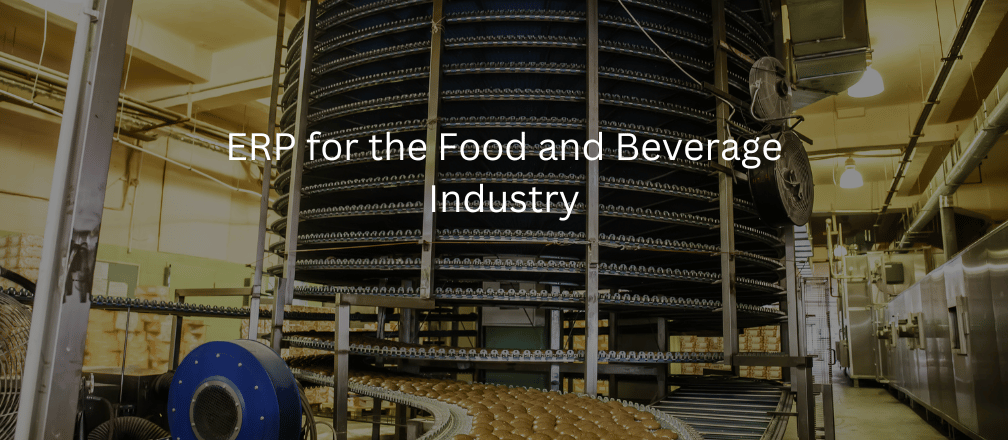ERP for the Food and Beverage Industry

The food and beverage industry is certainly one of the biggest industries. In such a huge requirement and fast-paced industry, one of the biggest challenges faced by businesses is to manage every aspect of their operation efficiently. Hence, implementing an ERP system that will be seamlessly integrated into different operations of the food and beverage industry helps it function as one comprehensive framework. Therefore, it becomes beneficial for businesses to seamlessly manage operation operations, irrespective of how spread it is.
What is an ERP solution?
ERP or Enterprise Resource Planning systems can be defined as software platforms that have the ability to combine several business processes into a centralized and unified system. Such systems generally encompass functionalities like accounting, inventory management, customer relationship management, human resources, and a lot more. Especially in the food and beverage industry, ERP solutions can provide a centralized system for businesses to track inventory, manage recipes, ensure compliance with health regulations, and handle sales requirements.
Understanding the importance of ERP in the food and beverage industry.

The food and beverage industry faces continuous challenges because this is a sector that requires managing perishable goods. Hence, businesses are required to adhere to the strict health and safety regulations. In addition to this, there is also a need to cope with the dynamic customer demands.
ERP systems are designed with industrial regulations and challenges kept in mind. These systems provide real-time data, improve flexibility for food safety, help in decision-making, and ensure compliance with industrial standards.
Moreover, ERP solutions can also be beneficial to managing the complexities of the supply chain, responding to market trends quickly, and dealing with seasonal fluctuations. Such adaptability is extremely crucial when it comes to matching the competitiveness and maintaining efficiency of the dynamic food and beverage sector.
There are numerous advantages to implementing ERP solutions for the food and beverage industries.
Efficient inventory management:
Implementing an ERP system can provide sophisticated tools that become beneficial for companies to keep track of inventory levels, including finished products and raw materials. Such a capability will be beneficial for businesses to maintain the optimum stock level and reduce the chances of stock out or overstocking. Efficient management of inventory is extremely important to minimize waste, especially when it is about perishable items. This can lead to a huge cost savings. With knowledge of the inventory, businesses can make sure that they have the products available when there is a customer demand.
Complying with the standards:
When it comes to the food and beverage industry, it is imperative to adhere to strict health and safety rules and regulations. Implementing ERP systems makes sure that the companies comply with the rules by recording and monitoring the quality control process. They make sure that the products meet the industrial revolution standards, thereby reducing the chances of reputational damage and costly repair. Automating the quality checks and maintaining a comprehensive report with ERP systems can be beneficial for businesses to maintain product quality and brand reputation and improve customer trust.
Increase traceability:
With the use of ERP systems and their advanced traceability features, businesses now easily keep track of the products from their origin to sales. In case of any quality issues with the product, such features will help to quickly isolate and identify the effective item. Increased traceability is important for food safety as it helps to get a rapid response in terms of health hazards. It is also effective in building consumer confidence as businesses can easily demonstrate the quality and journey.
Cost reduction:
Streamlining the different operational processes can be beneficial for ERP systems to significantly reduce operational expenses and administrative costs. As ERP systems have the feature to automate routine tasks, optimize resource allocation, and reduce manual errors, they become extremely beneficial. Such efficiency can easily translate to reduced wait, lower labor costs, and better resource utilization. With time, such savings can contribute to financial sustainability and increase profitability for any business.
Better planning for demands:
ERP systems are known to include great features that help keep track of consumer trends. As it can easily forecast future demands, it becomes beneficial. Therefore, it helps to proactively manage the inventory level according to the anticipated market requirements. Better demand planning prevents the chances of underproduction and overproduction. Therefore, make sure that the business is always ready to meet customer demands without fail. This forecasting ability in the ERP system can maximize the sales opportunity and reduce the holding costs of the inventory.
Enhance customer satisfaction:
ERP systems generally contribute to increasing customer satisfaction by optimizing different business processes in the system. As there are multiple operation operations in the food and beverage industry, and it directly works with consumers, it is greatly beneficial. It can have faster order processing, timely product delivery, and efficient production planning. This improves consistency and reliability in product, quality, and availability, so customers can seamlessly enjoy a great experience. This can increase the number of satisfied customers, which will help increase the number of buyers along with increasing the brand’s reputation. Hence, the ERP system has its benefits in every aspect of the business.
Data-driven decision-making:
Making use of ERP systems in the food and beverage industry can help take advantage of a centralized data system. It helps to get valuable insight to make strategic decisions. By properly analyzing data gathered from different departments, a business can seamlessly uncover inefficiencies, identify trends, and find new opportunities. Such a data-driven approach can be beneficial to make informed decisions about marketing strategy, operational improvements, and product development. This ability can be beneficial for quickly adapting to market changes and getting real-time advantage.
Choosing an ERP system for the food and beverage industry.
It is important to select the right ERP system solution for the food and beverage industry. The ideal ERP system will be able to meet the current requirements and forecast efficiently to keep the business in the competition.
The following are the major factors that you need to consider.
- Cost consideration: The ERP system’s cost is one of the major factors. This includes the initial purchase price and ongoing expenses like maintenance, training, and updates. Budget consideration is one of the major aspects of any food and beverage business before implementation.
- Scalability: Scalability is the next important feature in the dynamic food and beverage industry. As the market continues to change, and so does your business, the ERP system needs to scale accordingly with the changes. This helps to increase transactional volumes, expand operations, and introduce new product lines.
- Ease of use: The ERP system usability will have an impact on how quickly the team will be able to adapt. With a user-friendly interface, clear documentation, and navigation, businesses can easily adopt without much learning curve.
- Industry-specific features: When it is about choosing an ERP solution specifically for the food and beverage industries, businesses are required to make sure that it has the features. This most commonly includes shelf life management, batch tracking, complying with food safety standards, quality control, and recipe management. When the ERP system is customized according to the industrial requirements, it can ensure smooth operations.
Conclusion:
So, to make sure that you’re able to leverage the ultimate benefits of the ERP system, you need to make sure that you choose the right ERP solution. Especially when it comes to the food and beverage industry, the implementation of ERP solutions can be greatly beneficial.
Therefore, it requires you to make the right choice of a company that has decades of knowledge on implementing ERP systems along with all the other benefits. If you’re looking for one such company, Cogniscient is a great decision. With knowledge and trained individuals, they ensure successful and tailored implementation.

